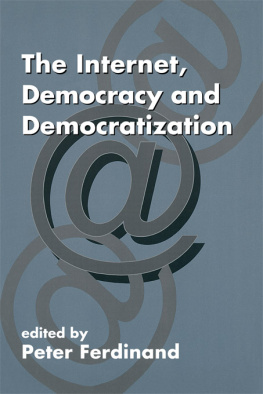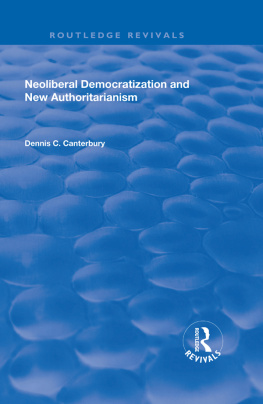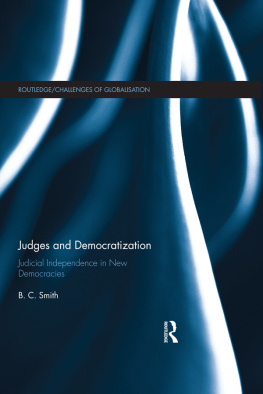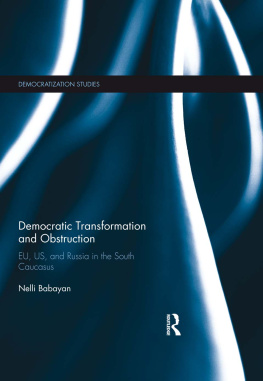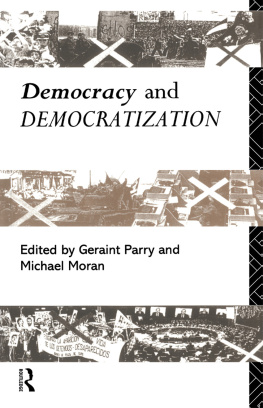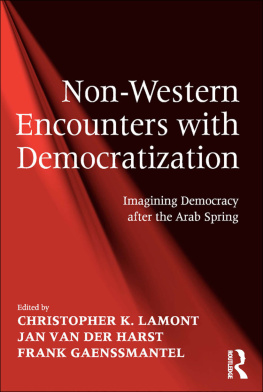The Internet, Democracy and Democratization
Books of Related Interest
Factional Politics and Democratization
edited by Richard Gillespie, Michael Waller and Lourdes Lpez Nieto
Democracy and North America
edited by Alan Ware
Civil Society: Democratic Perspectives
edited by Robert Fine and Shirin Rai
Democratization and the Media
edited by Vicky Randall
Social Democracy in a Post-Communist Europe
edited by Michael Waller, Bruno Coppieters and Kris Deschouwer
Post-Communism and the Media in Eastern Europe
edited by Patrick H. ONeil
Ecology and Democracy
edited by Freya Mathews
The Resilience of Democracy: Persistent Practice, Durable Idea
edited by Peter Burnell and Peter Calvert
First published in 2000 in Great Britain by
FRANK CASS PUBLISHERS
Reprinted 2004
By Routledge
2 Park Square
Milton Park
Abingdon
Oxon
OX14 4RN
Transferred to Digital Printing 2005
Routledge is an imprint of the Taylor & Francis Group
Copyright 2000 Frank Cass Publishers
British Library Cataloguing in Publication Data:
The Internet, democracy and democratization.
(Democratization studies)
1. Internet (Computer network) Political aspects
2. Political participation Computer network resources
3. Communication in politics
I. Ferdinand, Peter
323.04202854678
ISBN 0-7146-5065 X (cloth)
ISBN 0-7146-8114 8 (paper)
[ISSN 1465-4601]
Library of Congress Cataloging-in-Publication Data:
The internet, democracy, and democratization / edited by Peter Ferdinand.
p. cm. (Democratization studies, ISSN 1465-4601)
This group of studies first appeared in a special issue ... Democratization.
Includes bibliographical references and index.
ISBN 0-7146-5065-X (cloth) - ISBN 0-7146-8114-8 (pbk.)
1. Democracy. 2. Democratization. 3. Internet (Computer network)-
Political aspects.
I. Ferdinand, Peter. II. Democratization. III. Series
JC421.I57 2000
321.8 - dc21 00-29032
This group of studies first appeared in a Special Issue on The Internet, Democracy and Democratization of Democratization (ISSN 1351-0347) 7/1 (Spring 2000) published by Frank Cass.
All rights reserved. No part of this publication may be reproduced, stored in or introduced into a retrieval system, or transmitted, in any form, or by any means, electronic, mechanical, photocopying, recording, or otherwise, without the prior written permission of the publisher of this book.
Contents
The Internet, Democracy and Democratization
Peter Ferdinand
Beth Simone Noveck
Jennifer Stromer-Galley
Christoph Bieber
Rohit Lekhi
Peter Chroust
David T. Hill and Krishna Sen
Dana Ott and Melissa Rosser
John Bray
Peter Ferdinand
The Internet, Democracy and Democratization
PETER FERDINAND
The Internet has recently celebrated its thirtieth anniversary. Originally designed around 1969 to allow the exchange of packets of bits between computers, it remained for a long time restricted to the exchange of scientific data between scientists and secure information within government. Then electronic mail and bulletin boards became increasingly popular among those with access to it. It was only in the 1990s that it has become a popular means of communication. In 1993 the federal government opened up the network to commerce, and the creation of the Hypertext Mark-Up Language (HTML) laid the basis for universal accessibility.
Since then the growth has been phenomenal. A survey towards the end of 1999 suggested that 259 million people were now Internet users. Of these 111 million were in the United States, six times as many as the next largest figure which was for Japan. The survey predicted that the figures would rise to around 490 million by the end of the year 2002.
As a means of communication it has the potential to revolutionize political activity far more profoundly than the telephone or television ever did, for unlike them it offers the possibility of direct two-way interaction between the citizens and politicians. This has led to predictions that it will completely revolutionize government and democracy, even that the outcome will be a new wave of democratization world-wide, as authoritarian regimes find it difficult to survive and as established The purpose of this collection of studies is to examine that process.
Nevertheless the greatest impact of the Internet so far has not been in politics. Until now it has rather been upon business and commerce. It has already transformed marketing, procurement and recruitment functions of corporations in the United States. Now the impact is spreading to other parts of the world, partly through the socializing role of multinational corporations. At the same time the Internet has created opportunities for a whole host of new companies, principally dealing with information technology. Whilst making the use of the Internet as a core business function certainly requires the acquisition of technical skills, in other respects it may reduce the costs of entry into the marketplace for new companies. For example, they may be spared many of the start-up costs of acquiring premises because they can deal directly with clients or customers.
The first benefit of the Internet to be seized was its ability to reduce the costs of internal administration. It has considerably speeded up communication with colleagues and clients. It has also reduced the costs of transmitting data. And business commentators predict that one of its chief effects will be to reduce the number of intermediaries between the original providers of goods and services, and the final consumers. This disintermediation will challenge the traditional economic functions of wholesalers and retailers, agents, and so on. At least in theory it offers the prospect of more direct selling and more convenient buying. The more futuristically minded suggest a world with fewer large shops as people shop through the Internet, with fewer large offices, as individuals work from home, and fewer publishers, as writers, composers and performers distribute their creations directly through the Internet. They even suggest that the Internet will create a new paradigm of economics.
But in addition, as Internet usage caught on, and as people increasingly turned to the Internet to provide information services for others, it has become an increasing source of reference too. Instead of having to go to a library, individuals could surf the web and use search engines, to acquire an enormous amount of information. Whilst not underestimating the problems of the reliability of information to be found there, and the security issue of hackers possibly altering web sites without the site-owners even being aware of the fact, it nevertheless makes available a wealth of information on up-to-the-minute developments in the world that already far exceeds anything to which an individual could have had access previously. This will transform education, but it will also transform other agencies that need to process large amounts of information.
As a result, the institutions as well as individuals will be able to achieve much more. For example, the government of Finland has taken to the Internet for internal communication, and for diplomacy too. Previously the Finnish Foreign Ministry was unable to afford a presence in a large number of countries or a large research staff. It did not have sufficient information about diplomatic issues in many parts of the world to be able to make a constructive contribution to developments. Now that it can rely much more on the Internet to keep abreast of what is happening around the world, it feels capable of a much more significant role in international diplomacy. Similarly the Peruvian and Ecuadorian governments were quick to try to take advantage of the Internet for diplomatic advantage.

